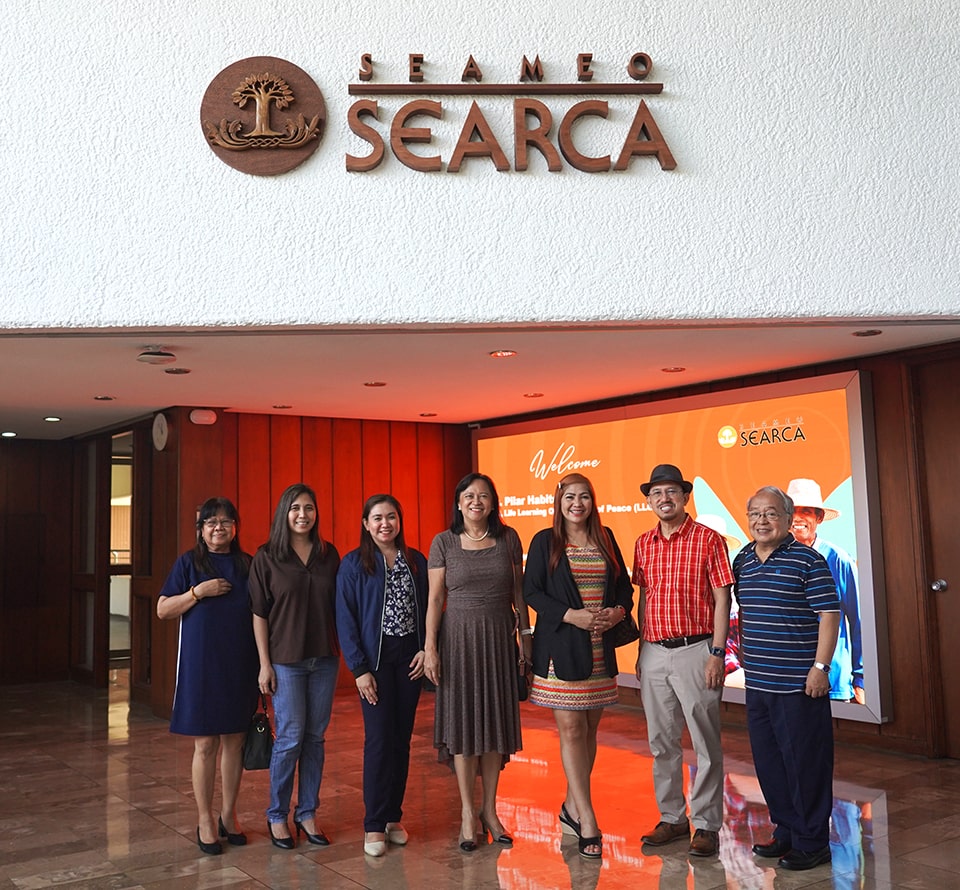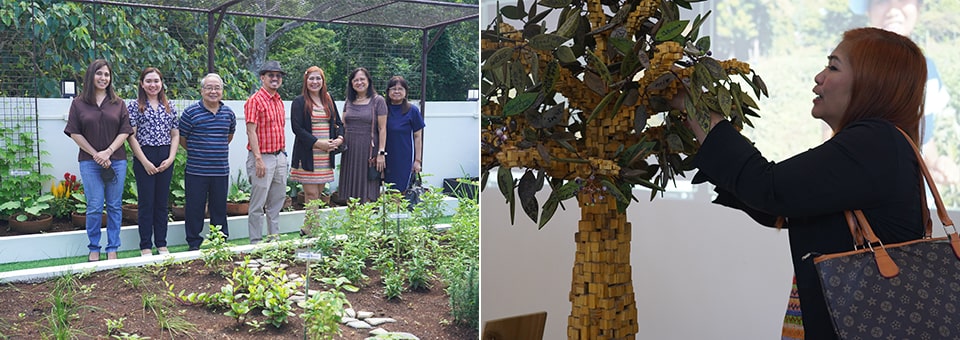Ms. Soledad Villanueva, Public School District Supervisor (PSDS) of the Philippine Department of Education (DepEd) Los Baños, Laguna Sub-office, and Ms. Pilar Habito, Chief Executive Officer, and Mr. Arturo Cariaga, both of Life Learning Organization of Peace, visited the Southeast Asian Regional Center for Graduate Study and Research in Agriculture (SEARCA) on 11 October 2024 for an exploratory meeting regarding a community engagement initiative focusing on school garden and youth entrepreneurship.
 Ms. Soledad Villanueva (third from the right), PSDS of DepEd Los Baños, Laguna Sub-office, and Ms. Pilar Habito (center), Chief Executive Officer, and Mr. Arturo Cariaga (rightmost), both Life Learning Organization of Peace, pose with SEARCA representatives led by Center Director Dr. Glenn Gregorio (second from the right).
Ms. Soledad Villanueva (third from the right), PSDS of DepEd Los Baños, Laguna Sub-office, and Ms. Pilar Habito (center), Chief Executive Officer, and Mr. Arturo Cariaga (rightmost), both Life Learning Organization of Peace, pose with SEARCA representatives led by Center Director Dr. Glenn Gregorio (second from the right).
Ms. Villanueva thanked the Center for its longstanding partnership with DepEd through the School-plus-Home Gardens Project (S+HGP). She expressed excitement about expanding the S+HGP and further strengthening DEpEd's Gulayan sa Paaralan Project in Los Baños.
Mr. Cariaga introduced the Life Learning Organization for Peace and shared its mission to foster community learning in Los Baños through collaborative thinking and interaction; mindful activities focused on health, environment, education, and arts; and livelihood initiatives framed as an entrepreneurship ecosystem in unity, solidarity, and teamwork. Ms. Habito added that they were inspired to create a financial literacy and youth entrepreneurship program to complement the Philippine Republic Act No. 10679, also known as the "Youth Entrepreneurship Act."
"According to the law, the promotion of financial literacy and youth entrepreneurship programs shall be inculcated in all education levels nationwide; however, we realized that there are no community-based learning hubs here," Ms. Habito explained.
LLOP plans to implement the program with DepEd Laguna and incorporate school gardening.
"What we need is coordination among ourselves, a collective effort among the organizations and institutions in the Los Baños community," she continued.
Dr. Glenn Gregorio, SEARCA Center Director, emphasized that although SEARCA is an international organization mandated to serve the Southeast Asian region, the Center has consistently reached out to the indigent villages in its host municipality, Los Baños. He mentioned community outreach activities, such as feeding programs, breastfeeding awareness initiatives, and donating nutrition and hygiene kits to senior citizens. In addition, Ms. Sharon Malaiba, SEARCA Partnerships Unit Head, shared about the Center’s partnership with United Laboratories, Inc. (Unilab), a leading pharmaceutical company in the Philippines, on a seminar on health and financial literacy for smallholder farmers.
The SEARCA team also shared some community engagement activities involving the youth. Ms. Anna Gale Vallez, Program Specialist, Research and Thought Leadership, reiterated the success of S+HGP and highlighted its offshoot projects: School-plus-Home Gardens cum Biodiversity Enhancement and Enterprise (SHGBEE) and the School Edible Landscaping for Entrepreneurship (SEL4E) Project.
Ms. Malaiba introduced Young Forces for Agricultural Innovation (#Y4AGRI), SEARCA's banner youth engagement initiative. Guided by the principle of "by the youth, for the youth, and with the once youth," the program aims to nurture young people as partners and stakeholders with the guidance of the once youth. She cited some of its activities, including Sowing Seeds: Cultivating Youth's Future in Agriculture, which aims to introduce agriculture to senior high school students and highlight its potential as a career, and the Youth in Agri Talk Show, a non-academic and nonconventional approach to learning to promote agriculture and its importance to Southeast Asian youth, particularly those in primary education.
The visitors were also briefed on the Center's funding opportunities, such as the Grants for Research towards Agricultural Innovative Solutions (GRAINS), which provide starter funds to researchers, scientists, inventors, and agripreneurs to scale up their technology or innovation model, and the Seed Fund for Research and Training (SFRT), which like GRAINS, provides starter funds to researchers and scientists. Both grants aim to foster innovation and development in agriculture but cater to different stages and types of projects. SFRT focuses more on initial research and training, while GRAINS is geared toward scaling up of innovations. The meeting closed with Ms. Habito expressing interest in submitting a proposal for SFRT.
 The visitors tour the SEARCA Sky Garden and the SEARCA Hub for Agriculture and Rural Innovation for the Next Generation (SHARING) AgriMuseum.
The visitors tour the SEARCA Sky Garden and the SEARCA Hub for Agriculture and Rural Innovation for the Next Generation (SHARING) AgriMuseum.